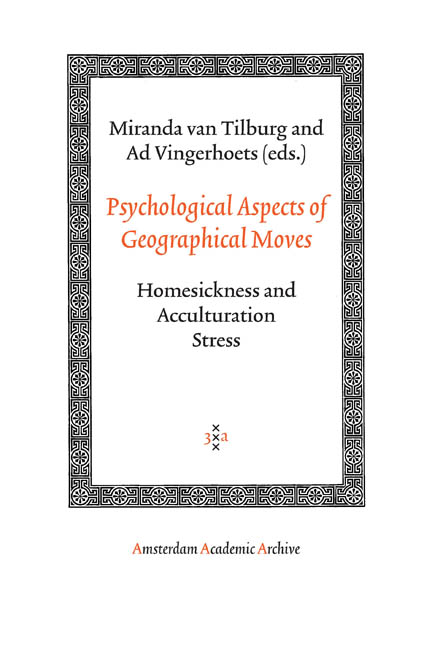Book contents
- Frontmatter
- Preface
- Contents
- Contributors
- 1 The Homesickness Concept: Questions and Doubts
- 2 Culture Shock, Homesickness, and Adaptation to a Foreign Culture
- 3 The Psychological Context of Homesickness
- 4 Geographical Moves and Psychological Adjustment
- 5 Homesickness and Acculturation Stress in the International Student
- 6 Psychological and Psychosocial Adjustment of Migrants: Families in a Changing Environment
- 7 Individual Differences in Acculturative Stress Reactions: Determinants of Homesickness and Psychosocial Maladjustment
- 8 The Cry for the Lost Placenta: Cultural Bereavement and Cultural Survival among Cambodians who Resettled, were Repatriated, or Stayed at Home
- 9 Children's Coping with Homesickness: Phenomenology and Intervention
- 10 Homesickness after Relocation during Early Adolescence
- 11 Personality, Temperament, and Homesickness
- 12 Homesickness, Personality and Personality Disorders: An Overview and Therapeutic Considerations
- 13 Health Issues in International Tourism: The Role of Health Behavior, Stress and Adaptation
- 14 Development of Psychopathology in International Tourists
- Miscellaneous Endmatter
9 - Children's Coping with Homesickness: Phenomenology and Intervention
Published online by Cambridge University Press: 23 January 2021
- Frontmatter
- Preface
- Contents
- Contributors
- 1 The Homesickness Concept: Questions and Doubts
- 2 Culture Shock, Homesickness, and Adaptation to a Foreign Culture
- 3 The Psychological Context of Homesickness
- 4 Geographical Moves and Psychological Adjustment
- 5 Homesickness and Acculturation Stress in the International Student
- 6 Psychological and Psychosocial Adjustment of Migrants: Families in a Changing Environment
- 7 Individual Differences in Acculturative Stress Reactions: Determinants of Homesickness and Psychosocial Maladjustment
- 8 The Cry for the Lost Placenta: Cultural Bereavement and Cultural Survival among Cambodians who Resettled, were Repatriated, or Stayed at Home
- 9 Children's Coping with Homesickness: Phenomenology and Intervention
- 10 Homesickness after Relocation during Early Adolescence
- 11 Personality, Temperament, and Homesickness
- 12 Homesickness, Personality and Personality Disorders: An Overview and Therapeutic Considerations
- 13 Health Issues in International Tourism: The Role of Health Behavior, Stress and Adaptation
- 14 Development of Psychopathology in International Tourists
- Miscellaneous Endmatter
Summary
Children's coping with homesickness: Phenomenology and intervention
How children and adolescents cope with homesickness deserves careful study for several reasons. First, homesickness is experienced by millions of children who spend time away from home and family. In children separated from home, self-reported prevalence rates of homesickness hover around 75%, depending on sample and environment characteristics (e.g., Fisher, 1989; Thurber, 1995a). The emotional distress, behavior problems, and deleterious physical, cognitive, and social consequences of homesickness have been well documented in young people (Burt, 1993; Fisher et al., 1990; Fisher & Hood, 1987; Fisher et al., 1986; Fisher et al., 1985; Thurber, 1995a).
Second, an understanding of how children cope with homesickness will guide interventions. Certainly, established treatments for the related constructs of depression and anxiety will influence interventions for homesickness. However, homesickness is a uniquely complex construct, in part because the stress of transition involves separation from familiar entities (home; attachment figures; native culture) and integration into a novel environment. This complexity warrants a thorough understanding of what children themselves are doing to cope with homesickness, and specifically, which of their ways of coping are effective.
Third, coping with homesickness involves, by definition, the uniquely stressful circumstance of separation from primary caregivers. This circumstance is steeped in research from the related domains of attachment (e.g., Ainsworth et al., 1978; Bowlby, 1969), temperament (e.g., Kagan, 1994), psychobiology (e.g., Hofer, 1994), and affect regulation (e.g., Calkins, 1994). From these literatures, we may hypothesize that insecure, inhibited, autonomically labile children who rely heavily on their parents for regulation of emotion will be more likely to experience distress upon separation, or become homesick, than their secure, outgoing, autonomically steady, self-reliant peers. Clearly, these affiliated literatures lend predictive power to an investigation of coping by identifying characteristics that may place children at risk for maladjustment to separation. Perhaps children's coping instinctively compensates for some of these risk factors. For example, some children may be able to form new attachments in novel environments. However, there may be some risk factors, such as autonomic reactivity, that transcend children's coping skills.
- Type
- Chapter
- Information
- Psychological Aspects of Geographical MovesHomesickness and Acculturation Stress, pp. 127 - 146Publisher: Amsterdam University PressPrint publication year: 2006



